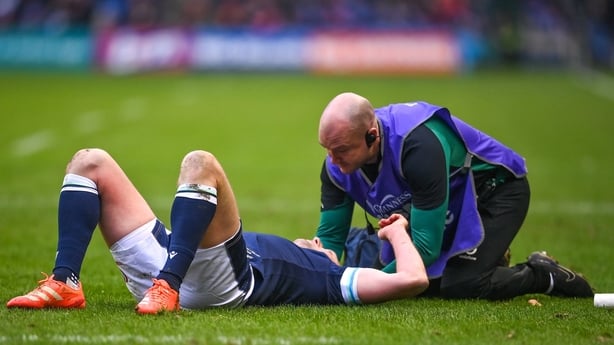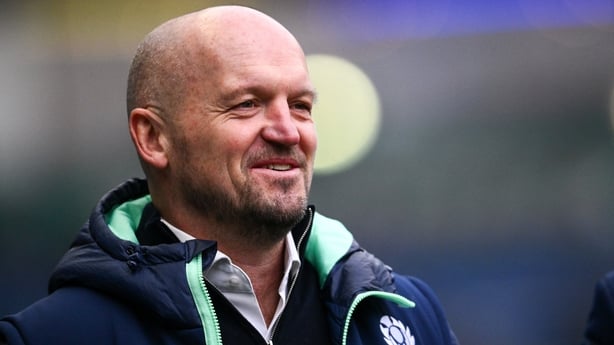While Ireland marched to another convincing Six Nations win on Sunday, their victory over Scotland left Gregor Townsend with a management dilemma.
Two of Townsend's star backs clashed heads and had to be removed from the field of play under the Head Injury Assessment (HIA) guidelines. The clash involved their attacking leader Finn Russell and one of their leading try scorers Darcy Graham, who collided during an attempted tackle.
It was Graham that came out of it worse, forced to leave on a stretcher, while Russell was removed and subsequently passed his HIA.
The out-half was deemed fit to continue, but Scottish management used their own judgement to deem their talisman unfit to continue.
Quotes attributed to Townsend suggest that Russell had some gaps in his memory from the game itself.
It was a commendable decision from Townsend. The hosts were already under pressure and with only two backs on the bench, it meant he would have to play his whole hand in removing both players from the pitch.
He was also down another star back when Duhan van der Merwe was sent to the sin bin for interfering with Calvin Nash as he kicked ahead towards the try line.

For Townsend to be aware enough to make the right decision is one thing, for him to do it when he was under pressure in a Test match and wouldn’t have been going against the medical guidelines is another thing completely.
As a coach, I’ve come across these moments.
Player welfare is of utmost importance. You sometimes have to remind yourself that there is a much bigger picture and regardless of what the outcome is, it’s only a game.
It cannot be misrepresented as much more than that when head injuries and brain trauma come into play. If we want the game of rugby to survive the modern physicality and increased awareness of the risk of brain injuries, then this is a great example to show that we are on board with the changes necessary for the game to thrive.
Every coach will face the moral dilemma, whether that is in the professional or amateur ranks.
Players are competitive by nature and they can try to shrug off or downplay any impact because of their will to do whatever it takes to play on, or because of a lack of experience when it comes to brain injuries.
I’ve suffered a couple of concussions on the rugby pitch. I’d like to think that I’d take concussions seriously regardless of my own experiences, yet it’s still human nature to understand something a lot more easily after we experience it first-hand.
In the amateur game, you would often have one doctor between two teams. The home team would provide the doctor, while both teams travel with a physiotherapist. The physio will be trained to deal with concussions and head injury assessments, but there is no HIA protocol in the amateur game because of the serious nature and the limited resources.
If concussion is suspected, then it is reported by the physio or referee and the player must go through a return to play protocol. There’s no assessment that allows them to return to the field of play at that stage.
It often falls back on physios to tend to injured players and not everything can be seen on the rugby pitch with close contacts. It means that players have to understand the risks, assess the situation and give honest feedback to the physio. They won’t see game footage replayed, like they do in the professional game, to help with their assessment.
It also means that coaches need to back their medics.
Players that experience head trauma can have an emotional response and it could leave a medic in a tough spot. Coaches need to have the awareness and back the medic in this situation. That is much more common now, but it hasn’t always been the case.

Scottish Rugby has championed a campaign with regards to the treatment of concussion.
Their jersey and match-day tops have the phrase "if in doubt, sit them out" in support of the grassroots campaign. The campaign has been heavily influenced by Peter Robinson, who sadly lost his son Ben due to the impacts of repeated concussion.
For Townsend, or whoever made the call on his team, to stand up and go against the HIA protocol, has backed this campaign and rugby’s stance on head injuries.
The campaign is advertised around Murrayfield, but Townsend’s stance on this matter will help enormously, not only with the campaign itself, but with the brain health of Finn Russell particularly.
We’re still learning about the impact of brain injuries and the signs or symptoms of these injuries. Anyone who has played the game will have hopefully changed their views on how important it is to err on the side of caution when it comes to a suspected concussion.
We also have to continue to educate our players, by empowering the medics and backing that up with actions.
Scottish Rugby might be disappointed with their result against Ireland, but they should be proud of their senior management team and the treatment of their players.
Watch Munster v Scarlets in the URC on Saturday from 4.45pm on RTÉ2 and RTÉ Player


